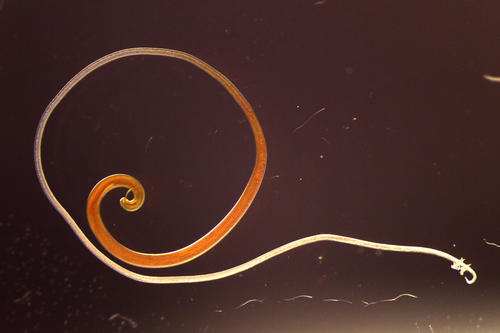Fighting Asthma with Whipworms
Professor Susanne Hartmann is developing the field of immunology of infectious disease as a research area at Freie Universität Berlin.
Aug 26, 2013
New studies offer hope that the whipworm could be used in developing a new asthma medication.
Image Credit: Friederike Ebner
Worms that live in the human intestine or skin leave most people feeling nothing but disgust. But these parasites can also be useful: They are apparently able to keep the human immune system in check in an intelligent way. This property could help precisely those patients whose immune systems “go crazy,” attacking even the body’s own tissue and missing invasive pathogens.
The results of this kind of chaos in the body’s defense mechanisms include allergies and autoimmune diseases such as allergic asthma and colitis, an inflammatory intestinal disease. Researchers at the Department of Veterinary Medicine at Freie Universität Berlin are harnessing the positive properties of parasites to develop new medications to combat allergies and autoimmune disease.
The team is headed by Professor Susanne Hartmann, who has been developing the field of immunology of infectious disease as a research area at the department since 2011. “We are studying whether mechanisms of regulating immune response following worm infections can be used to cure allergies and autoimmune diseases,” says Hartmann, who holds a Heisenberg Professorship at Freie Universität. This professorship is offered by the German Research Foundation (DFG) to allow outstanding scholars and scientists to establish a new discipline at a university of their choice.
One fundamental aspect of the research group’s work is the assumption that the number of patients in industrialized countries who suffer from autoimmune diseases and allergies has risen so sharply in recent decades because rising hygiene standards have meant that people have little contact with pathogens. The immune system practically no longer has anything to do, so, when confronted with allergens – harmless in themselves – it can overreact. This assumption is supported by the fact that allergies and autoimmune disorders are significantly more common in rich countries than in those with poorer segments of the population, such as developing countries and emerging economies. In those areas, on the other hand, worm infections are widespread.
Overreaction to harmless stimuli by the body’s natural defenses could be regulated by worm infections, Hartmann says: “The worms keep their host’s immune system in balance so that they are not attacked by the host’s natural defenses. By doing so, they create an environment that allows them to survive.”
Hartmann and her team are studying mechanisms that allow worms to survive in the host’s body for many years. Whipworms, for example, can live as long as 14 years in human tissue, laying eggs and reproducing all the while. “The majority of infected patients develop immunosuppression. That’s precisely the goal of the parasites, since weakening the immune defense benefits both parties: the parasite, because it doesn’t get attacked, and the host, because no pathological immune reactions develop,” Hartmann explains.
With her colleagues, the professor is studying what happens at the molecular level. She aims to find out which molecules the parasites use to regulate the immune system and which immune cells in the host’s body are targeted. “Although initial studies on a small number of patients show that administering worm eggs can alleviate illness, we don’t want to use worm infections to treat asthma or colitis, since that could cause undesirable side effects,” Hartmann says. Instead, her work is aimed at developing individual, defined worm molecules into a specific medication. Hartmann’s team hopes that these kinds of biological therapeutic agents will be highly effective and more easily tolerated than conventional medications.
Worm Molecules Could Be Used to Develop Medications
Hartmann’s fundamental research is so interesting to the pharmaceutical industry that an American company recently signed a cooperation agreement and an exclusive license agreement with Freie Universität. The contracts have to do with a study of Trichuris suis, a whipworm that infects pigs as its natural host.
A German company is already marketing T. suis eggs as a medication to fight autoimmune disease in humans. Several clinical trials are currently under way in Europe and the United States, testing this kind of medication. The American company aims to work with Hartmann’s working group at Freie Universität to develop a medication based on individual proteins derived from worm secretions.
The group’s studies of the pig whipworm offer reason to hope that the parasite could actually be helpful in fighting allergic asthma, Hartmann says. For example, her team has been able to show that administering pig whipworm larva products to mice suppresses typical asthma symptoms on a massive scale.
“The results were fascinating: Inflammatory activity almost completely disappeared. The researchers’ explanation for these findings is that the worm products trigger a massive immune regulation effect, which then also throttles back the asthmatic immune responses. Through a ‘transfer effect,’ other inflammatory reactions occurring in the body independently of the worm infection are blocked,” Hartmann explains.
Whether this works the same way in humans, she says, is still unclear. Only one thing is certain: There’s plenty of work for researchers in the new research area focusing on immunology of infectious disease, now and into the future.
Further Information
Prof. Susanne Hartmann, Department of Veterinary Medicine, Institute of Immunology, Freie Universität Berlin, Tel. +49 30 838-51824, Email: susanne.hartmann@fu-berlin.de

